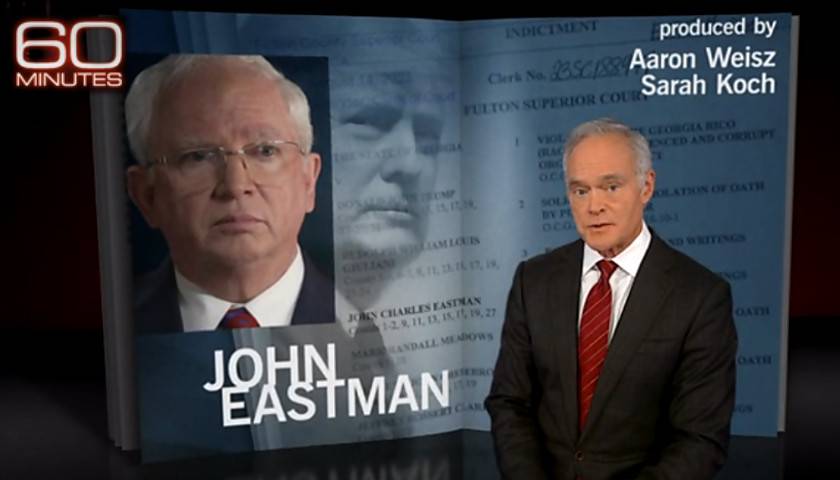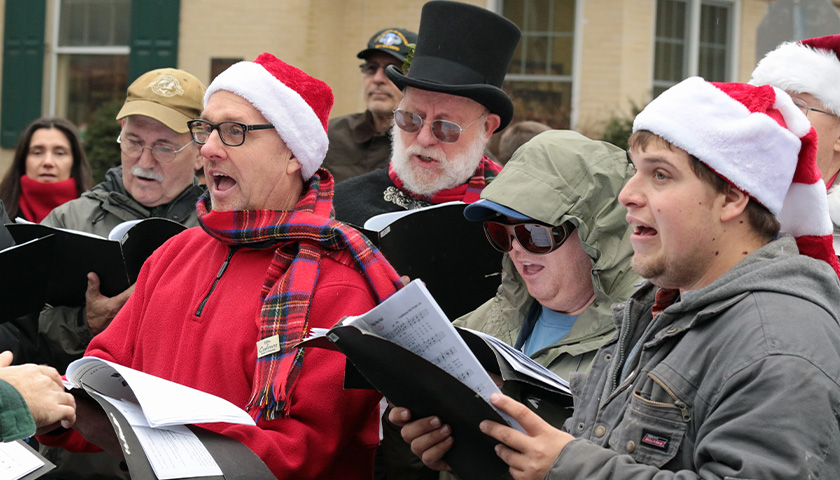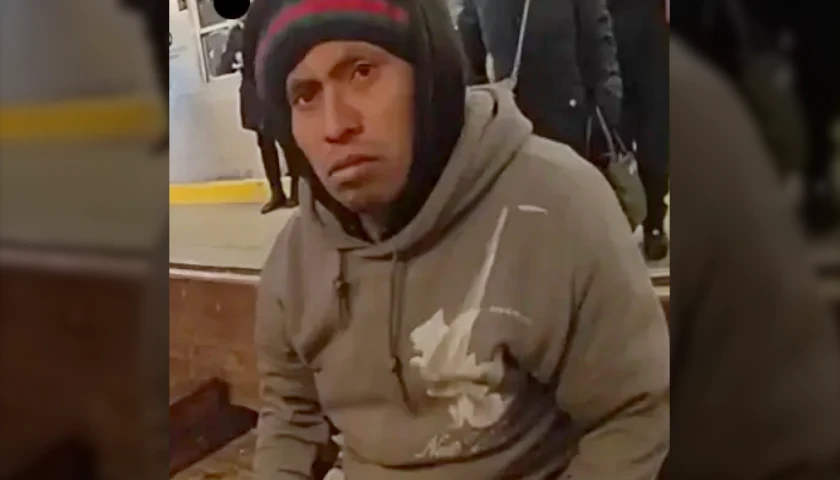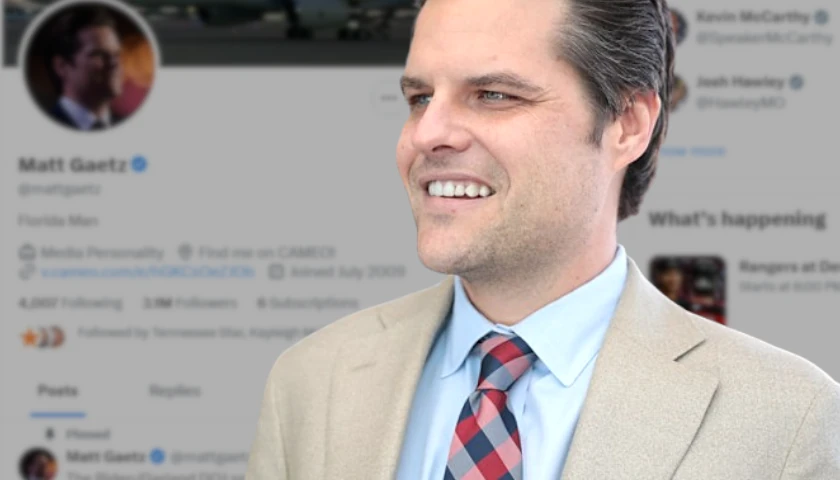The television news magazine show 60 Minutes aired a story on CBS Sunday about the lawfare against Donald Trump’s former attorney and constitutional legal scholar John Eastman, which repeated much of the mainstream media’s talking points about his legal advice to Trump regarding the illegal activity in the 2020 election.
CBS news anchor Scott Pelley interviewed both Eastman and former Vice President Mike Pence’s attorney Greg Jacob, who has made a considerable effort distancing himself from his advice in December 2020 stating that it was unclear whether the vice president had substantive authority regarding the acceptance of disputed electoral slates.
Pelley described Eastman as a “little known law professor” until he represented Trump in 2020, but Eastman is arguably the most preeminent law professor on the right, having clerked for Supreme Court Justice Clarence Thomas, founded the Claremont Institute’s Center for Constitutional Jurisprudence, and served as dean for Chapman University’s Dale E. Fowler School of Law.
Pelley mischaracterized Eastman’s legal work. He said, “In November 2020, Eastman joined Rudy Giuliani’s effort to persuade seven states to withhold certification of Joe Biden’s victory.”
But as the disbarment trial of Eastman has brought out, Eastman provided multiple options to Trump to choose from in order to deal with the broken election laws, and when he spoke to state legislators, he explained the legal aspects involved with those various options. As an attorney, his job is to provide legal analysis, not make political decisions. A six-page memo he gave Trump began with the option of Pence counting the disputed electoral slates, and included multiple possible scenarios where Biden would ultimately win. If the vice president chose to exercise unilateral authority, Eastman said delaying the electoral count was a better option than rejecting slates of electors, which the show didn’t mention.
Pelley pointed out that “not one state agreed to withhold certification of its vote,” but he failed to mention that significant numbers of legislators in the disputed states wanted to investigate the illegal activity, and many sent letters to Pence demanding he delay certification. For example, in Pennsylvania, 64 legislators signed a letter to their members of Congress asking them to block the state’s certification, and 88 legislators in five battleground states asked Pence in a joint letter to postpone their states’ certifications. In several of the disputed states, a handful of liberal Republican legislators held up any progress to decertify.
Next, Pelley claimed that “50 Trump lawsuits were failing” after the 2020 election. However, this has been refuted by a report put out by physicist John Droz and his team of statistical PhDs. They compiled a list of all 92 lawsuits from the 2020 election, and found that of the 31 that were decided on the merits, Trump and/or the Republican plaintiff prevailed on 23.
Pelley said that “two days before the [electoral] count, Eastman came to this Oval Office meeting with a radical interpretation” of the Constitution, referring to a meeting Eastman had with Trump, Pence, and others. This isn’t an accurate description, since the disbarment trial revealed that almost all legal scholars who have studied the issue of whether the vice president has substantive authority in this area have either concluded that he does or that the law is not clear.
Berkeley constitutional law professor John Yoo, who has authored scholarship on this issue including an article published immediately prior to the 2020 election, testified extensively during the disbarment trial of Eastman about the various positions other legal scholars have taken. The view that the vice president does not have substantive authority is a minority position, and a couple of those who have taken that position reversed themselves after progressives — many who supported the option in 2016 when Hillary Clinton lost — began asserting in 2020 that it wasn’t viable. Yoo said during the trial that there has been only one legal scholar ever who thought the vice president did not have the authority, University of Virginia law professor John Harrison. Harrison claimed that Congress has the authority.
Yoo called out the California bar’s expert witness on the topic, Matthew Seligman, as one of those who reversed himself. Seligman initially wrote in his scholarship that it was ambiguous whether the vice president had that authority, but testified during the trial that he doesn’t.
Jacob ignored the historical scholarship and said during the interview, “So it really was him inventing something without any historical roots or any historical foundations and desperately trying to find some hook in the constitutional text that neither history nor structure nor practice or common sense supported.”
Jacob contradicted his own memo he wrote for Pence in December 2020 analyzing the issue. “There is disagreement, however, whether the text of the Twelfth Amendment privileges the Vice President to play a decisive role in resolving objections to electoral votes on their merits, or whether (pursuant to the Electoral Count Act) the role of the Vice President in resolving dispute is largely ministerial,” he said.
He went on, “There is some historical evidence that Adams and Jefferson both resolved issues over the validity of electoral votes in their own favor, and in 1857 the President of the Senate (a role filled by Senator John Crittenden, as the Vice Presidency was then vacant) personally overruled an objection to the counting of Wisconsin’s electoral votes, and asserted that it was his responsibility to make the validity determination in the first instance, while suggesting that the House and Senate might thereafter jointly overrule him.”
Jacob added, “Because there are only a few instances of historical practice under the Electoral Count Act, however, the question of its constitutionality remains muddy, and scholars continue to this day to debate the constitutionally appropriate role of the Vice President in resolving objections to electoral votes.”
Jacob insisted that Pence “never wavered” on what his decision was going to be. But at a rally in Georgia two days before the certification on January 6, 2021, Pence gave a speech hinting that he might take action. “We’ve all got our doubts about the last election,” he said. “I share the concerns of millions of Americans about voting irregularities. Come this Wednesday, we’ll have our day in Congress. We’ll hear the evidence.”
Jacob said he was “outraged” when Trump said “the vice president and I are in total agreement that the vice president has the power to act,” “because I knew it was categorically false.”
Jacob also said, “I was not aware of any lawyers who agreed with him.” In addition to legal scholars like Yoo, whose article came out prior to the 2020 election, several of Trump’s attorneys agreed with Eastman’s analysis, which Jacob must have known. Trump’s former attorney Jenna Ellis sent him a memo on December 31, 2020 providing a legal analysis that contemplated Pence using his substantive authority. Giuliani also agreed, and spoke with many legislators about the topic.
A memo authored by constitutional attorney Ivan Raiklin known as “Operation Pence Card” was circulated around the White House in December 2020, which advocated for rejecting electoral slates. Trump tweeted it in late December.
Jacob said claims of illegal activity occurring with voting machines in Georgia were “false.” However, no one has ever been allowed to investigate the machines. Accountant Bryan Geels found 186,000 “phantom voters” in Georgia who registered before the 2016 election but weren’t in the 2016 voter registration file. Observers were sent home the night of the election, told the counting was halted for the night, but it resumed after they left, as satchels containing ballots were spotted on video underneath the tables.
Pelley told Eastman that his claim of 2,500 felons voting in Georgia’s election was false since officials found only four, and his claim of 10,000 dead voters turned out to be only four. Eastman shot back that he refused to let Pelley “mischaracterize” his testimony, pointing out that he’d said “there were as many as 2,500,” and that the Georgia Secretary of State’s office refused to turn over the evidence to determine whether the official claims are accurate or not.
Pelley asked Eastman why no state found fraud to overturn the election. Eastman responded and said it is because the people who tend to be in office don’t support that position.
Jacob sent an infamous email to Eastman on January 6 calling him a “serpent in the ear” of Trump. In it, Jacob said, “It was gravely, gravely irresponsible of you to entice the President with an academic theory that had no legal viability, and that you well know we would lose before any judge.” The show played dramatic footage of J6, with Jacob discussing how scary it was hearing the protesters, without acknowledging how his own memo may have encouraged them.
Jacob continued with sweeping statements like “The people who stormed the building believe Pence had the authority he didn’t have.” He ended by accusing Eastman, “He was mostly concerned with the results and didn’t really care how many laws had to be broken to get there.”
Pelley accused Eastman of advising Trump to “break one more rule,” but Eastman never said that. In his advice, Eastman cautioned that the law wasn’t very clear. He said the Supreme Court might decline to to side with the position that the vice president has substantive authority in this area by rejecting the litigation, because it’s likely a “nonjusticiable” issue, meaning that since the Constitution has clearly delegated the authority to one branch, the Supreme Court cannot get involved.
The show omitted much of the interview, but allowed a few statements by Eastman to remain. Eastman said during the interview, “We did nothing wrong, and it’s important to counteract the false narratives on that, because all of my actions were designed to investigate illegality in the election to see if they have an impact. … We’re no longer disagreeing about means to get to shared ends, and we’ve got wings of the two parties disagree fundamentally on the ends and the purpose of our government.”
When asked why he said the situation is “existential,” Eastman responded, “I think what we’re seeing now and the criminalization of political opposition, and the threat to shutting down speech of opposing political views, means that the people are no longer in charge of the direction of their government.”
When asked about being named as a defendant in the Georgia RICO prosecution of Trump and 17 others who challenged the 2020 election results, he concluded, “We have so corrupted our criminal law that this is even brought.”
Watch the full segment:
– – –
Rachel Alexander is a reporter at The Arizona Sun Times and The Star News Network. Follow Rachel on Twitter. Email tips to [email protected].
Image “John Eastman on 60 Minutes” by CBS News.





